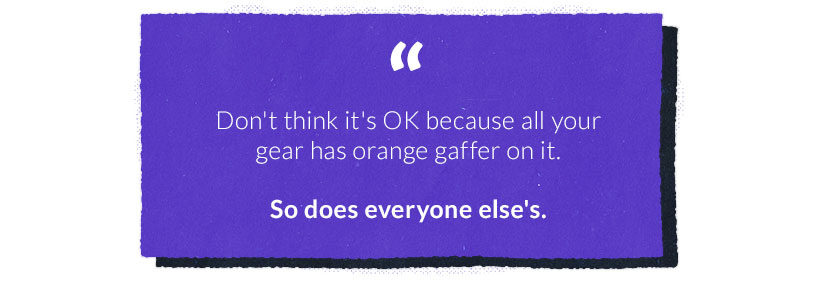It's great news. Your band got a gig somewhere near the foot of a festival bill. It's your chance to play to the biggest audience you've yet faced. But hold on—you've never actually played on a festival stage before, and the adrenaline rush of a golden opportunity starts to dilute as it dawns on you and your fellow band members that you're right back to where you were when you began playing live. You don't really know where to start.
Who does the sound? How will they handle your unique brand of whatever it is that makes you future headliners? What about the drummer's problems with the kit? What about the bass amp not being 100% reliable? What if you won't even be using your own gear? All these and so many more questions.
We asked two veteran sound engineers and tour managers, Bryony October and Mark Portlock, for their advice. Bryony has over 20 years experience working with top bands and artists, including Snow Patrol, Laura Marling, Foxes, and Billy Ocean. She is currently FOH (front of house) engineer for the multi-platinum-selling singer Katie Melua, the singer-songwriter Natalie Merchant, and the UK country duo Ward Thomas, as well as up-and-coming singer Lily Moore, daughter of the late Gary Moore.


Mark has been monitor engineer and FOH engineer for a host of bands and artists, including Jamiroquai, Tricky, Dexys Midnight Runners, Sailor, Happy Mondays, John Mayall & The Bluesbreakers, Big Country, Feeder, and Iggy Pop & The Stooges—and once he even handled monitors for James Brown. Mark is currently tour manager and sound engineer for Girli and Lion.
Let's talk about some golden rules for newcomers to the festival scene. What can you do to make it as easy as possible for a sound engineer who, most likely, you've never met before and who won't know your act?
"Absolute number one is an up-to-date channel list and stage plan," Bryony October says. "Nothing fancy: just a list of instruments, whether it needs a mic or a DI box, and also who needs it in their monitors. That way the team of people on stage know what to expect and what needs to be plugged in where."
A set list comes next. "Be sure to add any instrument changes and comments about the style of each song," Bryony says. "Also, short and simple mix notes for engineers at both ends, monitor and out-front, indicating the general style of music, FX preferences, guitar or other solos, and so on. These elements need to be clear, preferably typed out, and as brief as possible so they can be viewed and digested at a glance."
On the all-important subject of power, Mark Portlock says: "If you are working outside your own country, make sure you have power adaptors for all your gear. One trick I use is to put an IEC Plug on all my four-way boards. I then just need a 'kettle cable' with a local plug on it. That way, you just change the kettle cable per country, not all your plugs. This is great for hotel rooms, too. Don't forget, though, that this only works with 220 V, so EU only!"
Mark says if you have the luxury of "advancing" your show with the promoter, make sure you include an up-to-date stage plan, an input list (keep it simple), and a brief description of your desired sound style—simply rock, pop, electro, or whatever.

What about your gear? Let's suppose you're lucky enough to be able to bring your own. What should you have done beforehand?
"Make sure you have spare internal fuses for amps, especially Fender," Mark says, "and tubes are a good idea, too. You are unlikely to find them in a field. Same goes for strings, picks, and drumsticks. Also, make sure you label your equipment clearly with band name and contact number. Don't think it's OK because all your gear has orange gaffer on it. So does everyone else's."
Mark says that if you get to use the house backline, that's not a bad idea. "The stage crew will look after it for you, and you'll save time in setup, which can be used more productively with a soundcheck. The added bonus is you will be loaded out quicker and be free to enjoy the festival. Don't forget to take your own breakables, though, like cymbals, snare, and tuners."
Bryony says a band good enough to play at a festival using their own gear should be sure it's in full working order, with spares for everything that might need a spare. "That means tubes, batteries, and strings, plus spare guitars that are also tuned up before the performance in case of a string breakage mid-song. You should also have your cabling tidy and in order, labelled clearly if necessary—this is especially so for the back of the keyboard, and for an amp with multiple channels."
Most festivals are pretty well-organized these days, but bands often get asked to play at less-professional outdoor events, too—private parties, small local shows, and so on. But what happens in the event of bad weather?
"It's unlikely you'll play in rain, high winds, or lightning on an unprotected stage, as it's dangerous," Mark says. "Most festival stage managers take the elements into account and plan accordingly."
How about great weather? "My biggest tip is sunscreen. Factor 50, and lots of it. You get burnt very quickly on a stage, and you don't realize it's happening."
Bryony is similarly cautious about potentially deadly weather. "It's up to the festival to provide a watertight stage and the area to set up and perform in. If for any reason you feel like there is going to be a situation where water and electricity meet, you should not be on that stage. Likewise in the event of a thunderstorm, the stage area should be evacuated. These things must be taken very seriously."

Without the chance of a run-through beforehand, what tips can these two experienced engineers offer newcomers to ensure a good sound?
"Notes, notes, notes, especially for the monitor engineer," Bryony says. "This is a must, because if you can't hear what you're doing, you don't have a hope. Also, don't be precious about coming out on to the stage in line check—the first part of the soundcheck—and running half a song. Even if it doesn't go through the PA, it can always go through the monitors, so you can get halfway to the sound you need.
"Ultimately, the sound of the band through a PA is up to the band making that sound," she continues. "All us engineers do at the end of the day is turn it up and polish it. I'm not going to use the age-old adage, but you know what I'm getting at here. The band need to think about their arrangements so that the band sound great at source. This is the key to sounding good."
"And keep it simple," Mark adds. "The fancy stuff will come later. Sing properly down the mic. Don't turn your backline up too loud. Be nice! Good will goes a long way to motivating people to be their best for you."
As with the set list, make monitor and out-front mix notes, Bryony says. "But also, anyone with a mic should have a basic script. This is always better and more professional than trying to talk to the audience ad-hoc when you aren't an experienced performer. In fact, even the super-experienced performers I work with still have some kind of script every night, even if it's well-lodged in their head at this point."
Be confident in yourself, Mark says. "The best bands can play under any conditions, and they don't rely on specific monitor mixes or a long soundcheck. Write good songs, learn them properly, and play together. Remember you're a band, not a scientific project. Don't upset anyone. Don't take cans of beer on stage. ... And do take the overworked stage crew a cup of tea."

Bryony echoes that heartfelt plea. "Always be humble, patient, and kind. The people on stage and mixing out front are invariably working extremely long days, so try to make it easy and pleasant for you, and they will return the favor. Any offers of a cold drink, beer, or food always go down well. When you approach the crew, try to make sure it's not at the worst possible time—mid-changeover, say, or the first couple of songs into a different band's set."
Last, I couldn't resist asking if these two gigging veterans had any anecdotes they could share, even if just to serve as a warning to the inexperienced.
Bryony: "I worked for a band once that in the excitement of it all threw a guitar out into the audience and accidentally knocked someone out. The police were waiting when they came off stage, and it was all sorted—until a few hours later when, to add insult to injury, a friend of the band saw one of the friends of the victim walking around with said guitar. He accosted them, accusing them of stealing it!"
Mark: "It's a learning curve. Have fun. In fact, if I say anything to people starting out, it's take care. Look after each other and the people around you. Playing a festival can be a dangerous business!"
About the author: Gary Cooper is a journalist working in the musical instrument and pro audio fields. He contributes to a number of music magazines and websites. He lives in Sussex, England.
